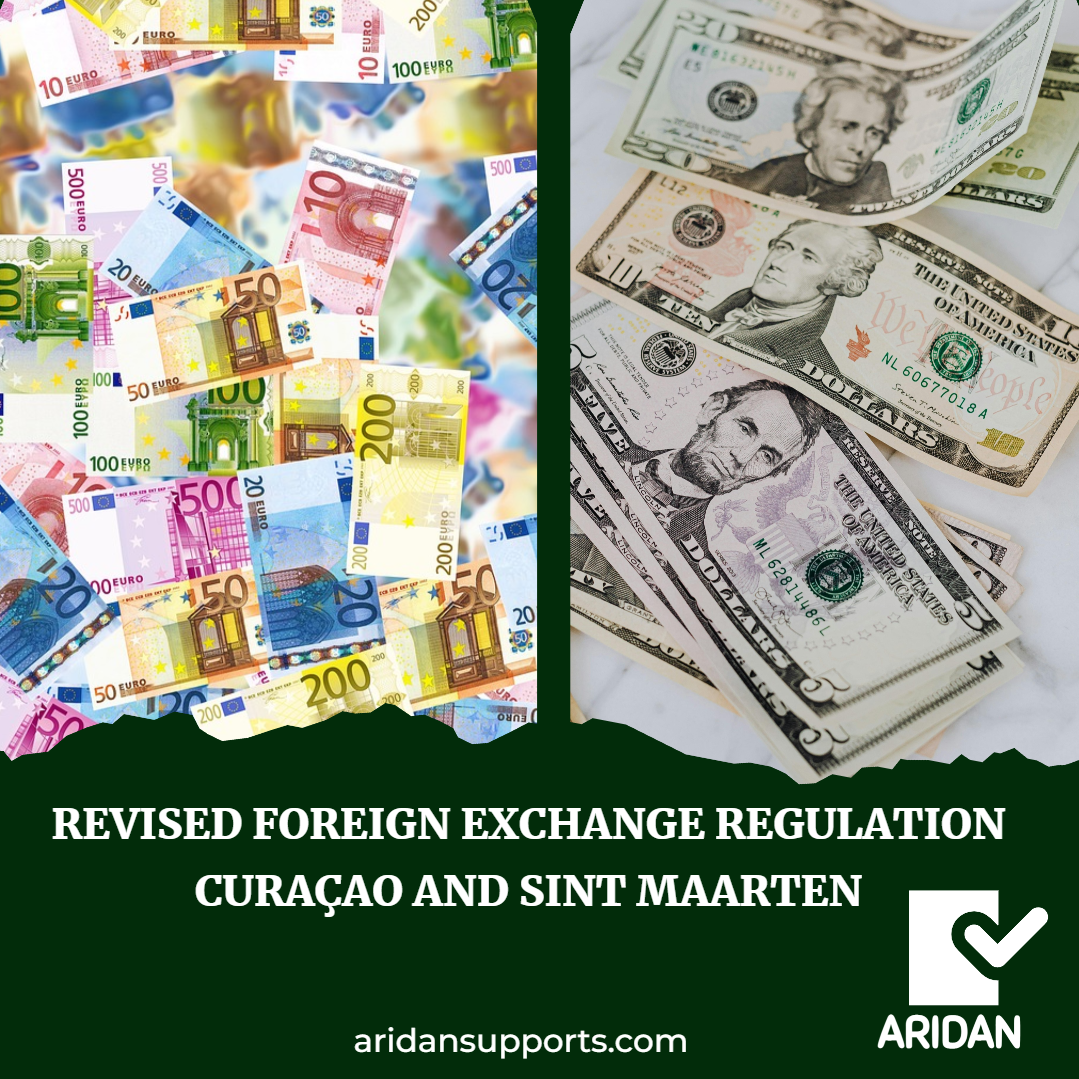The Central Bank of Curaçao and Sint Maarten (CBCS) will implement a revised foreign exchange regulation on October 1, 2024, designed to reduce the administrative burden of the licensing process and speed up the granting of foreign exchange licenses.
The foreign exchange regulation serves as a practical implementation of the Foreign Exchange Transactions Regulation for Curaçao and Sint Maarten (Regeling Deviezenverkeer Curaçao en Sint Maarten). It includes directives for foreign exchange banks on managing foreign exchange transactions, a list of capital transactions requiring a license, publications of general licenses and exemptions, and rules and guidelines for reporting foreign exchange transactions to the CBCS by foreign exchange banks.
The Foreign Exchange Regulation 2024 takes effect on October 1, 2024, and thereby replaces the Foreign Exchange Regulation 2017 of February 20, 2017.
KEY REFORMS IN THE REGULATION:
Increased Transaction Limit
The transaction limit that triggers the need for a foreign exchange license will rise from NAf. 150,000 to NAf. 500,000. This change is expected to significantly reduce the number of transactions requiring a license, thus lowering administrative demands.
Personal Transfer Flexibility
Previously, a license was required for personal transfers exceeding NAf. 250,000 annually to foreign bank accounts. Under the new regulation, a license is only required for transfers above NAf. 500,000 per year, providing more flexibility for individuals managing personal funds.
Loan Transactions
Loans from foreign exchange banks to non-residents will no longer require a foreign exchange license, removing a barrier that previously delayed certain cross-border financing activities.
Non-Resident Account Adjustments
Non-resident accounts exceeding NAf. 250,000 will no longer need a license unless transferring funds abroad. A license is now only required for transfers of NAf. 500,000 or more.
Guarantees to Non-Residents
Residents will now be able to provide guarantees to non-residents without needing a license, although payments abroad exceed NAf. 500,000 will still require a license.
INTEGRITY AND COMPLIANCE REQUIREMENTS FOR LICENSE OR EXEMPTION APPLICATIONS
For the remainder of the article, we will focus on Chapter 8 of the “General Administrative Regulations of the Foreign Exchange Regulation 2024, Implementation decrees of the Foreign Exchange Regulation Curaçao and Sint Maarten (2010)”. This chapter highlights the integrity and compliance requirements when submitting an application for a foreign exchange license or a foreign exchange exemption.
The CBCS remains committed to maintaining stringent anti-money laundering (AML) and combating the financing of terrorism (CFT) measures, even as the new regulation simplifies the foreign exchange process. All applications for foreign exchange licenses or exemptions will continue to be subject to rigorous integrity checks, including:
IDENTIFICATION REQUIREMENTS
Applicants for licenses must be properly identified, ensuring they are not listed on any sanctions lists associated with Curaçao or Sint Maarten. Financial service providers submitting applications on behalf of clients must also verify client identities in accordance with local financial service identification laws and international AML/CFT guidelines.
SANCTION SCREENING
The sanction screening process remains an integral part of the application. Service providers are required to conduct checks in accordance with the Sanction Acts of both Curaçao and Sint Maarten, ensuring that applicants are compliant with AML/CFT/CFP provisions and guidelines.
DOCUMENT SUBMISSIONS
For legal entities, applications must include identification documents for managing directors, supervisory directors, and ultimate beneficial owners (UBOs). Additionally, applicants must submit certified extracts from the Chamber of Commerce and Industry and copies of articles of incorporation. A list of UBOs, along with the shareholders’ register, must also be provided for sanction screening purposes.
Required Documents for Foreign Exchange License or Exemption Applications for Legal Entities
When applying for a foreign exchange license or exemption, legal entities must submit the following documents to ensure proper identification and compliance with regulatory requirements:
- Certified Extract from the Chamber of Commerce and Industry
A certified document confirming the registration details of the legal entity. - Articles of Incorporation
A copy of the legal entity’s articles of incorporation, outlining its structure and purpose. - Identification Documents of Key Individuals
Copies of identification documents (such as passports or identification cards) for the following individuals as defined in the LID Article 1, paragraph 1, section j and the LBWT Article 1, section ee:- Managing Directors
- Supervisory Directors
- Attorneys-in-Fact
- Ultimate Beneficial Owners (UBOs)
- List of Ultimate Beneficial Owners (UBOs)
A complete list of UBOs, detailing the individuals who ultimately own or control the legal entity. - Shareholders’ Register
A copy of the legal entity’s shareholders’ register, which includes the names and details of shareholders for sanction screening purposes. - Sanction Screening Statement
A written statement, if applicable, from the civil-law notary, trust office, or law firm confirming that all individuals have undergone sanction screening and no matches were found. This would be similar to the Declaration of Identification and Sanction Screening on the now outdated Checklist of documents to be submitted with application for a foreign exchange exemption.
FUTURE CHANGES AND REPORTING OBLIGATIONS
Any future changes in UBOs must be reported to the CBCS, necessitating a new application for a foreign exchange license or exemption. Failing to meet integrity requirements will result in the rejection of applications.
UPCOMING ONLINE APPLICATION FOR FOREIGN EXCHANGE LICENSE REQUESTS
As of October 1, 2024, all applications for a foreign exchange license must be sent to the CBCS through the intermediation of a foreign exchange bank. This will guarantee adequate assistance of customers with transactions that require a foreign exchange license, safeguard the integrity of foreign exchange transactions, and facilitate the introduction of an online application for foreign exchange license requests.
As part of the reforms, foreign exchange banks will soon be able to submit foreign exchange license requests through the reporting web portal of the CBCS. Until then, the current foreign exchange license request forms can be downloaded from the CBCS website.
FINAL THOUGHTS
The key objective of these reforms is to accelerate the granting of foreign exchange licenses and ease certain financial transactions, both locally and internationally. It is expected that businesses and individuals alike will benefit from these changes, which reduce the need for licenses on smaller transactions while preserving the essential safeguards against illicit financial activities.
It also provides a more detailed list of the documents required to request a license or an exemption. Looking forward to the digitization of the process which will enhance operational efficiency for local and international (offshore) legal entities engaged in foreign exchange activities.
Sources
Centrale Bank van Curaçao en Sint Maarten. (2024). Foreign Exchange Regulation 2024. Retrieved September 30, 2024, from https://cdn.centralbank.cw/media/legislation_forex/20240930_foreign_exchange_regulation_2024.pdf
ARIDAN. (2024). Understanding Curaçao’s new UBO registration decree. Retrieved September 30, 2024, from https://aridansupports.com/understanding-curacaos-new-ubo-registration-decree/
ARIDAN. (2024). Understanding the landscape of Curaçao’s foreign exchange policies. Retrieved September 30, 2024, from https://aridansupports.com/understanding-the-landscape-of-curacaos-foreign-exchange-policies/
ARIDAN. (2024). Foreign exchange license vs exemption: What’s the difference? Retrieved September 30, 2024, from https://aridansupports.com/foreign-exchange-license-vs-exemption-whats-the-difference/








